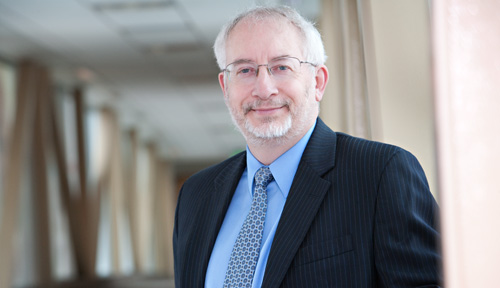I’d like to take a minute this month to reflect on the changing world of medical education.
Like other medical schools around the country, UNMC is headed toward some major changes in how medical students will learn.
The traditional lecture delivered in a large amphitheater appears to be going the way of the dinosaur. The flipped classroom and independent small group study is now growing as the preference of students across the U.S.
In a flipped classroom model, students review basic background information in the form of a video lecture or other modality to acquire the fundamental principles of a topic on their own time before they come to class. In class, instead of listening to a lecture, students now use the time to discuss case studies or other problems in teams.
So, why the change, you ask? Well, it turns out that information retention is better for students in the flipped classroom environment.
This approach can have a huge impact on teachers. They are no longer delivering a lecture of facts to passive students, but rather are in the role of a facilitator. They push students to come up with answers on their own and to challenge each other. It’s a whole different skill set.
Among its many potential benefits, the recently launched UNMC Teaching Academy will undoubtedly play a critical role in preparing our faculty to excel in this new teaching methodology.
On a related note, earlier this month, Gov. Pete Ricketts signed the state budget. It was a huge endorsement of the changing world of medical education. It included $25 million for construction and $2 million annually for operations and maintenance of the UNMC simulated education center, iEXCEL.
Although, significant additional funding will be required to move the project forward, the support of the state legislature and governor is a huge step forward in making this world-class project a reality.
The iEXCEL center, which will be built across Emile Street from the Sorrell Center, will further revolutionize medical education. It will provide students with the ultimate hands-on training. They’ll be able to practice procedures on simulators until they have mastered them. When they finish this training, they will be more ready to see patients than any generation before them.
They will learn sophisticated surgical procedures using robotic surgery techniques. For a generation that grew up with computer video games, it will be a perfect fit. It will be Play Station on steroids. Given the rapid advances in robotic surgical technology, it may well be that many of the most well-prepared future surgeons are currently 12-year-olds who are masters of the latest video games.
Looking back on my career in medical education, it’s almost unbelievable how far we have come. I started out using slide carousels and overhead projectors.
If you ever made a presentation at an international meeting, you held your breath that your slide carousel would work (European and U.S. carousels frequently didn’t mesh). And, who in my teaching generation hasn’t had their slides tumble out of the carousal shortly before their presentation or found that they were in the carousal backwards or out of order?
Thankfully, slide carousels and overhead projectors are now gathering dust – long since replaced by PowerPoint. It won’t be long before we talk about PowerPoint in the past tense as well.
But, through all the technological advancements, one thing has never changed. It doesn’t matter what teaching modalities you use, the best teachers are still the ones who know how to connect with students and instill them with the desire to learn.
Medical education will no doubt continue to evolve. But, I am confident that UNMC will be more than ready for it.
